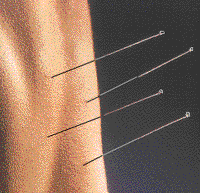ACCUPUNCTURE
As I am sure you are already aware, Accupuncture is a form of traditional Chinese medicine. It works on the principle of meridians and the movement of qi. Qi is the life force of the body: it moves the blood and gives nutrients to the body. Problems of circulation such as fluid retention indicates that there is a lack of qi in that area of the body. Meridians influence the flow of qi throughout the body. Meridians are the places where the qi flows close to the skin, along a pathway that will run through or around internal organ/s (e.g. there are meridians in the wrist that link to the heart, lungs and kidneys. By placing a finger over any of these meridians, we can test the strength and vitality of any of these organs by monitoring the strength of the pulse).
There are between 500 and 360 accupuncture points in the body. These are the points which electromagnetic energy or qi flow through. This form of treatment has now been in practice for over 3000 years. When a chinese wise man was asked why people today do not live as long as the ancients, he replied that the ancient people followed the yin/yang (positive and negative attributes of qi) patterns - living from the eart, not overindulging in poisons (such as alcohol and narcotics), sex or food and were harmonized between body and spirit.
The Philosophy of Accupuncture:
- Holistic medicine
- Macrocosm is contained within the microcosm
relating to the environment we are in
- Constant change
energy in the body circulates just as the seasons change
- Everything is relative to the whole, yet nothing is absolute
As already mentioned, the principles of yin and yang are the positive and negative attributes of qi. Yin is contemplative, yang is active, yin is negative, yang is positive, and so the associations go on. More associations are listed below.
YIN
Inner; Cold; Nourishing; Female
Night; Blood; Winter
Introvert
YANG
Active; Hot; Draining; Male;
Day; Qi; Summer; Qi
Extrovert
Some Chinese Terminology
Qi
moves blood
is a form of energy
gives nutrients to the body
Wei Qi
is a protective form of qi
forms the outer energy or aura
is defensive or preventative qi
Shen
the vital life force
The stimulation of qi relieves pain. Accupuncture is the art of qi stimulation via needles, pressure or hot bowls placed over the corresponding meridians. Therefore it can be said that accupuncture is a method of pain relief. However the Accupuncturist must also look at all factors of the patient, as it is also a holistic medicine. There are three major factors that contribute to disease recognised in Chinese Medicine. They are:
Contributing Factors of Disease
ENVIRONMENT - the "external evils"
wind, cold, heat, dry, damp, etc.
WAY OF LIFE
diet, occupation, physical activity, relationships, etc.
EMOTIONS - the "internal evils"
joy, anger, fear, obsession, hate, etc.

Also to be considered by the practitioner is the five elements. All living things are made up of a combination of these five elements, and a balance of these elements is what forms a healthy individual. An upset in this balance causes sickness/weakness in an individual.
THE FIVE ELEMENTS OF CHINESE MEDICINE
EARTH
- stomach and spleen (digestive organs - transformation and transportation)
- holds blood vessels and the organs in place
- appetite, lips, mouth, sweat
- worry, anxiety, excessive thinking, obsessions
FIRE
- Summer
- Yang
- TRIPLE HEATER: heart, pericardium and small intestines
- lack of joy, depression, insomnia
- controls blood vessels, houses Shen (spirit), overall circulation
- speech, tongue, bitter, complexion
METAL
- Autumn
- Yang-yin combination (more yang than yin)
- Lungs, colon
- Respiration, elimination of waste, moves qi
- Grief and sadness
- Skin, pungent
WATER
- Yin
- Kidneys and bladder
- Regulates water metabolism and filters impurities
- Reproduction, growth, development (in brain and bones), stores Jing (genetic makeup)
- Fear and withdrawal
- Ears, salty
WOOD
- Spring
- Yin-yang combination (more yin than yang)
- Liver, gall-bladder (irregularities often shown in alcoholics)
- Stores and filters blood, promotes free flow of qi, moves tendons and muscles, influences the menses
- Anger, aggression, impatience, frustration, emotional yo-yo (up and down constantly)
- Eyes, sour
EMOTIONAL BALANCE AND HARMONY SIGNIFIES A GOOD BALANCE OF THE ELEMENTS.
That is all the information that was provided in our day lecture. I hope you found some interesting parts in it and gained new knowledge in this area of holistic medicine. This page is designed as a database, not as a schooling mechanism.
HOLISTIC MEDICINE | HOME | HOMEOPATHY
VIEW | GUESTBOOK | SIGN
!!! E-MAIL ME !!!